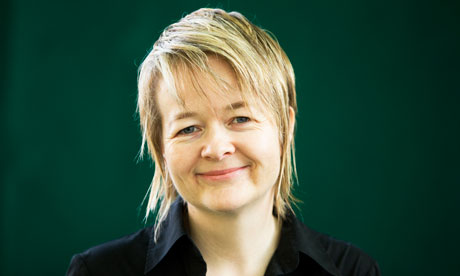
08 Aug 2010 00:40:54
It was a nightmare which a saw at the literary festival at Dartington Hall, when the novel The Little Stranger was born. It was one dream in the course of month. I found myself musing on ghosts – and started to wonder whether a spot of the supernatural mightn't be just the thing to perk up my barely begun new novel.
The novel was to be set in the 1940s, and was to have as its background changes in the British class system. It had been inspired by the deep anxiety I'd seen at work in the fiction of conservative 40s writers such as Angela Thirkell and Josephine Tey – an anxiety about a changing social system and a newly confident working class that amounted, at times, to a kind of hysteria. In looking for a way to address the issue, I had been thinking of attempting a rewrite of Tey's fascinating but deeply troubling novel of 1948, The Franchise Affair. Now, lying in the darkness at Dartington Hall, it struck me that I could take the class tensions underpinning conservative postwar paranoia and rewrite them as something actively paranormal. I suppose I was thinking, in effect: "I'll give those snobs something really to get hysterical about!"
When the book was in bookshops, I understood that, for some readers, this was a challenge I had not met. After that, I have grown used to hearing Dr Faraday abused as dull, annoying, frustrating. A lot of readers in their e-mails asked me to explain the end of novel, to settle a dispute between friends, or between the members of a book group, about who or what it is that Caroline recognises when she calls out "You!" in the moments before her death. My usual response is to say that I deliberately left the resolution open; that I wanted to do justice to the essential strangeness of the supernatural; that I am very happy for readers to make up their own minds. All this is true – sort of. The fact is, I worked hard to spike the novel with clues as to where, exactly, the "bundle of projected repressions" which consumes Hundreds Hall has its roots; the spikiest of these is the book's last line. When these clues do snag their reader, I experience a glow of writerly satisfaction and feel I pitched things just right.
What about The Little Stranger? It is about conflict and waste. I never wanted its effect to be tidy. No other novel of mine has inspired such a range of responses in its audience, and that's been a fascinating experience.
The novel was to be set in the 1940s, and was to have as its background changes in the British class system. It had been inspired by the deep anxiety I'd seen at work in the fiction of conservative 40s writers such as Angela Thirkell and Josephine Tey – an anxiety about a changing social system and a newly confident working class that amounted, at times, to a kind of hysteria. In looking for a way to address the issue, I had been thinking of attempting a rewrite of Tey's fascinating but deeply troubling novel of 1948, The Franchise Affair. Now, lying in the darkness at Dartington Hall, it struck me that I could take the class tensions underpinning conservative postwar paranoia and rewrite them as something actively paranormal. I suppose I was thinking, in effect: "I'll give those snobs something really to get hysterical about!"
When the book was in bookshops, I understood that, for some readers, this was a challenge I had not met. After that, I have grown used to hearing Dr Faraday abused as dull, annoying, frustrating. A lot of readers in their e-mails asked me to explain the end of novel, to settle a dispute between friends, or between the members of a book group, about who or what it is that Caroline recognises when she calls out "You!" in the moments before her death. My usual response is to say that I deliberately left the resolution open; that I wanted to do justice to the essential strangeness of the supernatural; that I am very happy for readers to make up their own minds. All this is true – sort of. The fact is, I worked hard to spike the novel with clues as to where, exactly, the "bundle of projected repressions" which consumes Hundreds Hall has its roots; the spikiest of these is the book's last line. When these clues do snag their reader, I experience a glow of writerly satisfaction and feel I pitched things just right.
What about The Little Stranger? It is about conflict and waste. I never wanted its effect to be tidy. No other novel of mine has inspired such a range of responses in its audience, and that's been a fascinating experience.

